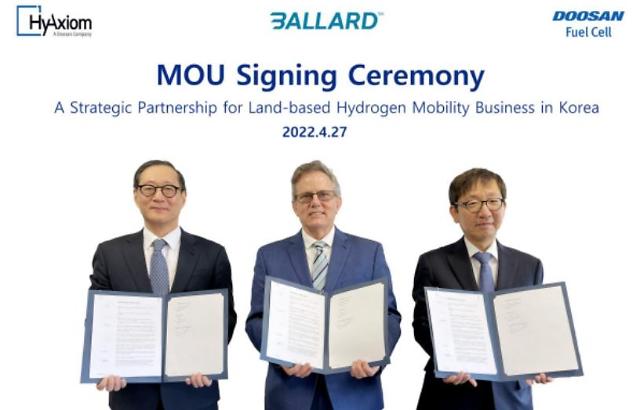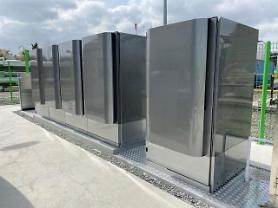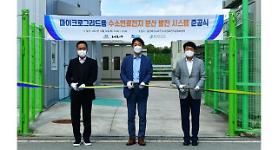
[Courtesy of Doosan Fuel Cell]
SEOUL -- Doosan Fuel Cell partnered with Ballard Power Systems, a Canadian manufacturer of polymer-electrolyte membrane fuel cells (PEMFC), to develop a hydrogen fuel cell system for mobility. PEMFC is being developed mainly for transport applications as well as for stationary and portable fuel-cell applications due to its high energy efficiency, simple structure and excellent durability.
Hydrogen fuel cells use hydrogen as fuel to produce electricity. Small-sized cells are installed in eco-friendly vehicles such as full-size sport utility vehicles while larger cell systems are used in hydrogen power generators. Doosan Fuel Cell and its U.S. subsidiary, HyAxiom, have signed a memorandum of understanding with Ballard Power Systems at HyAxiom's headquarters in Connecticut.
Ballard's PEM fuel cells use a solid polymer membrane (a thin plastic film) which is permeable to protons when it is saturated with water, but it does not conduct electrons. HyAxiom is competitive in the field of phosphoric acid fuel cells (PAFC) that use liquid phosphoric acid as an electrolyte.
Doosan Fuel Cell said that the three companies would try to preoccupy the global market with high growth potential by cooperating in developing and mass-producing PEM fuel cell systems for mobility, selling hydrogen buses, and supplying hydrogen and electric charging stations. They would seek to pilot a domestic hydrogen bus business in South Korea in 2023 and launch buses equipped with HyAxiom's hydrogen fuel cells for mobility within the next two years.
"This agreement is meaningful in that it is a strategic alliance in which the three companies enter not only domestic but also global markets together," Doosan Fuel Cell CEO Chung Hyung-rak said in a statement on April 28. "We will actively foster PEMFC for hydrogen mobility as Doosan Fuel Cell's new growth engine along with solid oxide fuel cells for marine mobility that is currently being developed."
South Korea is investing heavily to utilize hydrogen fuel cells as a new power source. In 2021, Doosan Fuel Cell partnered with the Hyundai shipbuilding group to co-develop a megawatt-class solid oxide fuel cell (SOFC) system for vessels. Because SOFC has a high power output compared to its size, the fuel cell system is ideal for powering mega-sized heavy equipment such as oil tankers and giant tunnel boring machines.
Doosan Fuel Cell's SOFC system operates at 620 degrees Celsius. Lower temperatures dramatically increase the number of potential applications and provide the opportunity to incorporate a wider variety of materials in SOFC power generation systems with greater reliability and lower cost.
In September 2021, Doosan Fuel Cell secured its first contract to export hydrogen fuel cells for power generation. Fuel cells will be used as a distributed power source to supply electricity as well as heat for cooling and heating to apartments and buildings in Foshan, Guangdong. Distributed energy systems, which generate and store power near the point of consumption, can accommodate a variety of renewable and alternative energy sources.
Because hydrogen fuel cell power generation systems are much smaller than thermal power plants or hydropower plants, they are ideal for providing power to microgrids, which are networks of small, isolated smart power grids, in urban environments.
Copyright ⓒ Aju Press All rights reserved.



